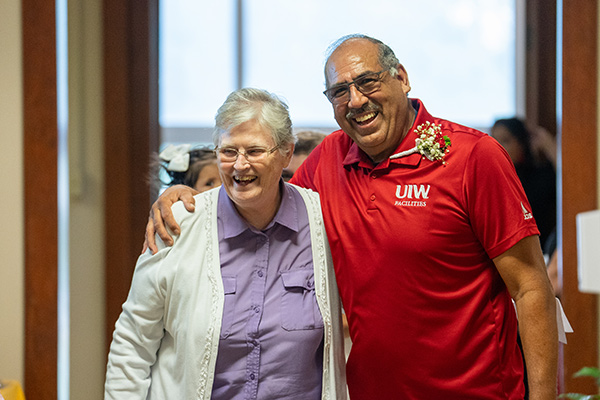Employee Faith and Spirituality Initiatives
 Employee Faith and Spirituality Initiatives at the University of the Incarnate Word offer programs like faculty development, social justice workshops and ethics across the curriculum. We also have a Mission Committee that sets goals for our faith-based initiatives. Our New Employee Orientation program includes our Philosophy of Orientation to introduce new team members to our values. We offer Mission retreats for spiritual growth and reflection.
Employee Faith and Spirituality Initiatives at the University of the Incarnate Word offer programs like faculty development, social justice workshops and ethics across the curriculum. We also have a Mission Committee that sets goals for our faith-based initiatives. Our New Employee Orientation program includes our Philosophy of Orientation to introduce new team members to our values. We offer Mission retreats for spiritual growth and reflection.
Faculty Development
“Building an Intentional Culture of Social Justice: Increasing Understanding and Competence in the Curriculum” is a three-year faculty development project to assist full-time faculty in reinforcing the concept and reality of social justice in classroom instruction.
The project is based on the belief that UIW best fulfills its education ministry for the Sisters of Charity of the Incarnate Word by providing the next generation of dedicated UIW students with the ideas and skills necessary for transforming the world.
Catholic Social Teaching is foundational to educating concerned and enlightened citizens who will address the needs of the modern world and the empowerment of all people.
Further, as educators, we believe that energizing students to engage in social and political action addressing poverty, violence and ecological degradation, requires an intellectual understanding of social justice built on human dignity, solidarity with the poor and respect for all.
“Ethics Across the Curriculum: Focus on Ethical Decision-Making” is a three-year faculty development project to assist full-time faculty in developing their skills in presenting strategies and techniques for helping students become better decision-makers in ethical matters.
Our project is based on the belief that UIW will best fulfill its education ministry by providing students with the ethical awareness and skills necessary for serving society as concerned and enlightened citizens. The Strategic Planning Goals for the undergraduate educational experience include an objective to increase the ethical decision-making skills of undergraduate students. The need for faculty development in this area was reinforced by a review of course descriptions which were found to lack references to “ethical decision-making.”
This faculty development project aims to equip full-time faculty with the resources and teaching techniques that will enable them to develop and implement an ethical decision-making component in appropriate courses. The intent is to use Christian ethics as the basic theoretical framework while acknowledging parallels in other faith traditions.
Faculty will use this framework and a common ethical decision-making model to explore how to respond to the challenges facing professionals in such areas as business, education and health care. This approach will enable students to be as self-conscious about ethical decision-making as they are about the need to develop in other professional skills.
University Mission Committee
The University Mission Committee is composed of representatives from the various schools and administrative areas. Its main responsibilities revolve around the following:
- To understand the Mission, core values and what they mean in everyday life and work situations.
- To assist in creating an environment that promotes Mission and values.
- To advise on ways to integrate Mission and values into every aspect of the organization.
- To be the eyes, ears and heart of the institution.
- To provide a forum to discuss ideas, resources and concerns regarding Mission and values.
- To design celebration activities (e.g., Heritage Week and Incarnate Word Week).
To identify, facilitate and reinforce the integration of Mission values in all aspects of campus life.
- To promote educational activities that help to deepen our appreciation for incarnational spirituality and its relationship to Mission.
- To articulate the behaviors that exhibit Mission value integration.
- To foster the University's role in demonstrating the Church's social mission.
- To participate in Mission-centered hiring processes.
- To continue the ECE dialogue.
- To lead the CCVI Spirit Award and the Student Spirit Award processes.
New Employee Orientation
The heart of the orientation process is grounded in the desire to educate individuals on the Mission and traditions of the University of the Incarnate Word community. The philosophy of orientation has remained stable over the years.
As a result of the entire orientation process (pre-employment orientation to re-orientation) employees of the University should:
- Discover a responsible for the Mission of the University, to such an extent that they routinely exceed expectations;
- Embrace, not only the goals of their discipline and department but also, the institutional vision;
- Feel that they belong to a faith-based community that extends beyond the job responsibilities;
- Experiences a sense of ownership about the University, their place and function within it;
- Value team success over individual accomplishments;
- Reach beyond the specifics of their job description;
- Understand that their interactions impact students;
- Recognize that serving students means knowing their life histories as well as their demographics.
Mission Retreats
Part I: Call and Mission: Then and Now, participants follow the mission journey of the early Sisters of Charity of the Incarnate Word, learning about their foundation and ministries. They visit places where the CCVI’s lived and worked, and “get a glimpse of their passion for bringing the love of God made visible in Jesus to all those they met.”
Part II: An Experience in Culture, Identity and Diversity focuses on how values, beliefs and views of self and others shape our view of the world and indicates how together as associates in CCVI sponsored ministries we can shape a new worldview.
Part III: Foundations of Peace invites participants to envision how we might create a culture of peace and justice in the world.

